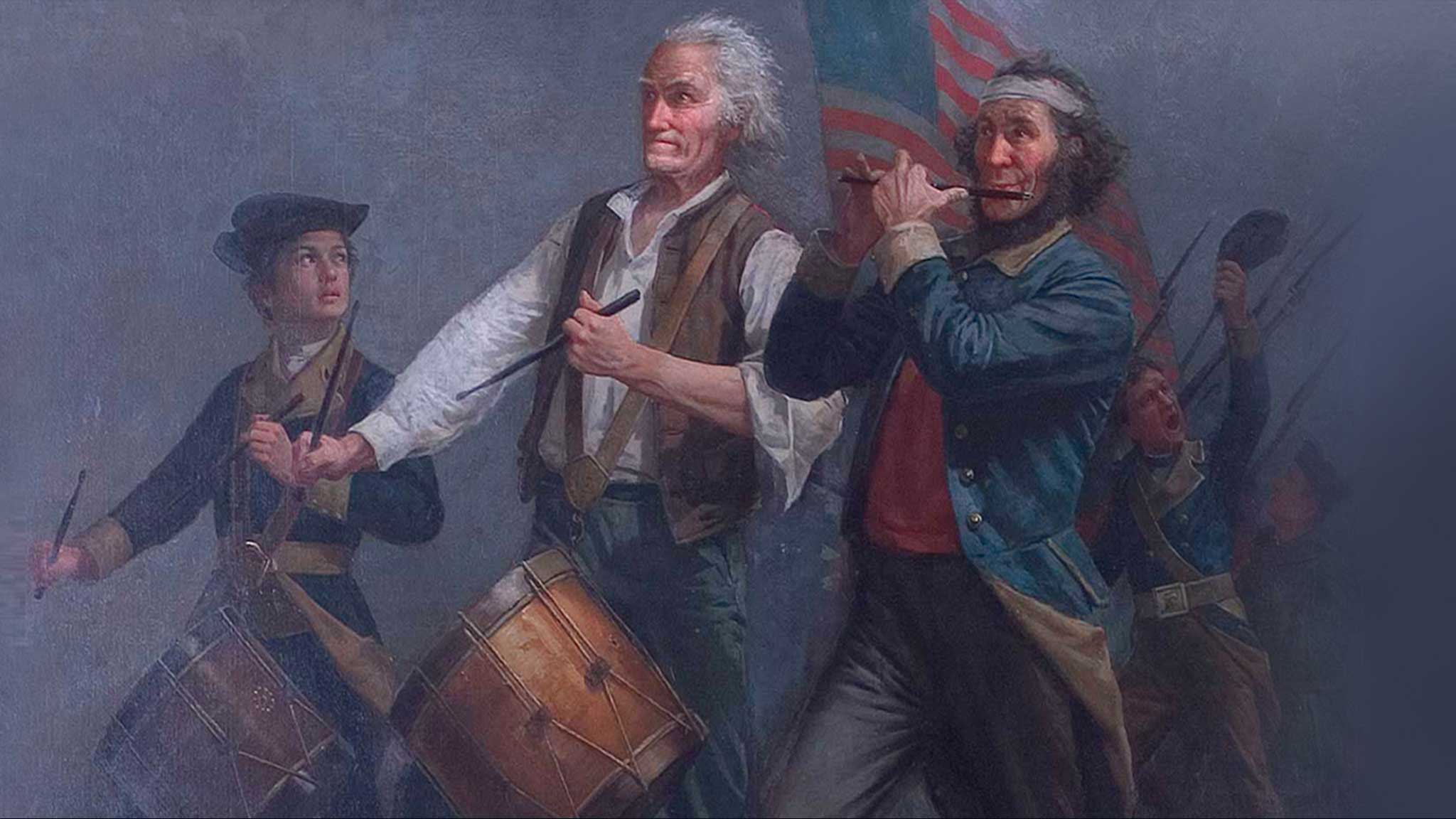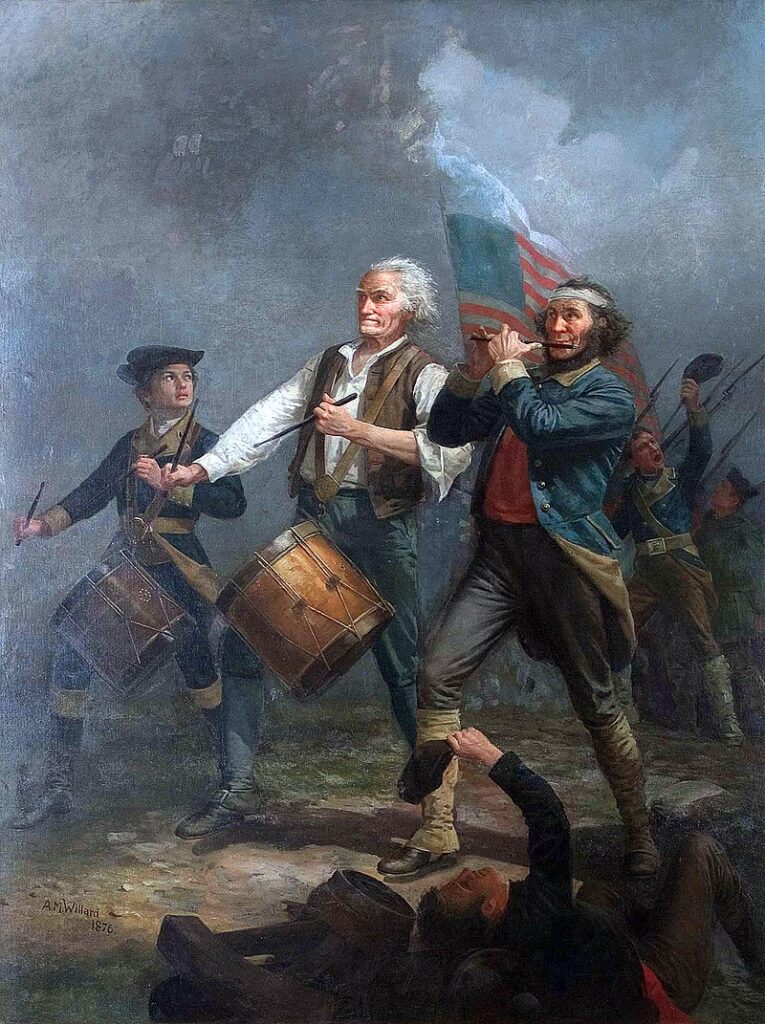Founding Principles of the United States: The Spirit of ’76


With the publication of the Declaration of Independence, we may say that we come to the beginning of the United States as a union of mature political societies. Of course, we could have an interesting and probably interminable conversation about the origins of the United States if we look for what we might call the “seeds” of the people from England who first settled here. In his excellent multi-volume history of colonial America Conceived in Liberty, Murray Rothbard begins his discussion of the origins of America with long-ago migrations of northern Europeans into the British Islands. Yet with the Declaration of Independence, the thirteen colonies of British America became thirteen free, sovereign, and independent states, assuming “among the Powers of the Earth, the separate and equal Station to which the Laws of Nature and of Nature’s God entitle them.” At this point, we can say that the new states had become mature political societies able fully to govern themselves without the assistance of outsiders. The political principles that animated Americans of our founding generation are written into the Declaration of Independence, and were held to embody the Spirit of ’76. In what follows we will examine this spirit, and it should be born in mind that the form of government established under its principles is rather different in its self-understanding than many Americans today will find familiar. Yet this is an important part of American history, and thus it is important to understand it.
The independence of the thirteen American states was formally recognized by the British crown in the Treaty of Paris in 1783. That treaty says in Article I: “His Britannic Majesty acknowledges the said United States, viz., New Hampshire, Massachusetts Bay, Rhode Island and Providence Plantations, Connecticut, New York, New Jersey, Pennsylvania, Delaware, Maryland, Virginia, North Carolina, South Carolina and Georgia, to be free sovereign and independent States; and he treats with them as such, and for himself his Heirs & Successors, relinquish all claims to the Government, Propriety, and Territorial Rights of the same and every Part thereof.” In this article of the treaty, we find the word “sovereign.” This word appears for the first time in the development of western political thought in 1576 in Six Books of the Republic by Frenchman Jean Bodin. We may say in brief scope that sovereignty is the authority to govern without the permission of another. But where does sovereignty lie? Who has it? Is it something to which some people have a right and others do not, such that some people have the authority to command and others the obligation to obey? Can sovereignty be divided? These questions animated the people of our founding generation, as it did English legal thinkers, because it was to them a foreign notion of limited value, sitting uneasily with the idea that the English political tradition is an organic growth, and not a product of rational design. However, the idea of sovereignty developed with the rise of the national state as a form of government in the sixteenth into the seventeenth centuries, and in this development, sovereignty was the defining property of governments. It was embraced by the British crown, and later by the Parliament, but in America, the idea developed a very different expression.
The idea of the state as it developed, rather violently, in Europe is that the state is an agency of coercive authority having a monopoly in the use of force over a prescribed territory, the right to command the people living in that territory, and the right also to extract its revenues from those people. When we consider this definition of the state, it becomes clear that the state is not compatible with liberty as Americans understood it since the state claims authority to command people’s conduct without their consent, and to take such portions of people’s property as they deem necessary. The great Virginia patriot Richard Henry Lee famously pointed out that “[i]f Parliament may take from me one shilling in the pound, what security have I left for the other nineteen?” The idea being asserted is that if some person or institution in society may take property (which money is) from me without my consent, I cannot be said to be free. This emphasis on the freedom of the individual, understood as a requirement of the rights we each hold by nature, leads to a different form of government than had developed in Europe.

In 1765, the British Parliament passed the Stamp Act that imposed a tax on paper products in the colonies. So if one owned books, newspapers, pamphlets, letters, even playing cards, they had to bear the King’s stamp showing the owner had paid the tax. It is usual to say that Americans opposed “taxation without representation,” but this phrase is too ambiguous to communicate much of value since it entails the idea that if a duly elected representative legislature decided to tax voters at a rate of 100%, that would be fine. The quote above from Richard Henry Lee is an expression of the commonly held view that any tax on incomes, that is, any direct tax on citizens, is oppressive by its nature and not to be tolerated.
In 1774, Thomas Jefferson wrote A Summary View of the Rights of British America. A reader can see in this document the approach of the Declaration of Independence. Jefferson is clear to say to the British king that Americans are no longer asking for their rights to be respected, but are now demanding it.
Toward the end of the document, when Jefferson is making the American position clear to the king, he writes: “Let those flatter, who fear: it is not an American art. To give praise where it is not due, might be well from the venal, but would ill beseem those who are asserting the rights of human nature. They know, and will therefore say, that kings are the servants, not the proprietors of the people.” This last sentence insisting that kings are the servants of the people and not their proprietors reverses the British understanding of sovereignty in which the people are not properly called citizens, but subjects of the sovereign crown. An important element of the American Spirit of ’76, enshrined in the Declaration of Independence, is that each state is a sovereign political society with the right and authority to govern held by the people thereof.
In the Declaration of Independence, we read that it is to protect our rights to life, liberty, and property (which is the meaning of “happiness”) that people establish governments among themselves, and thus if government fails in its narrow purpose, “”it is the right of the People to alter or abolish it, and to institute new Government, laying its Foundation on such Principles, and organizing its Powers in such Form, as to them shall seem most likely to effect their Safety and Happiness.” It is important to note here that this assertion of the right of the people both to establish government and to abolish it when it misbehaves is exactly how true sovereignty of the people works. Kings are the servants, not the proprietors, of the people. This principle of local sovereignty of the people is re-enforced a bit farther into the Declaration thus: “But when a long Train of Abuses and Usurpations, pursuing invariably the same Object, evinces a Design to reduce them under absolute Despotism [‘in all cases whatsoever’], it is their Right, it is their Duty, to throw off such Government, and to provide new Guards for their future security” (emphasis added). We should observe here that by the mid-19th century, leaders in the North in general and particularly in New England, had come to call this sort of thing, that is, people choosing to throw off a despotic government, “treason.” Contemporary Americans should discuss this question of treason since it is a serious charge that has been used frequently, and a good place for this conversation to begin is Article III, section 3 of the Constitution where treason against the United States is defined.
The Spirit of ’76 is the spirit of independence and the liberty of individuals in their communities, where alone self-government can be exercised. If the people are sovereign, then government is a creature of the people and thus subject to them. This supervision of government was done throughout the colonial period through conventions of the people in their various colonies. The Philadelphia Convention of 1787 that produced our Constitution was a convention of the states in which the states chose delegates to represent them, and to return the product of their deliberations to the states for debate and ratification in conventions of the people in each state. Moreover, if the people are sovereign, then government is not sovereign, for in the theory of sovereignty, it cannot be divided, for then one half of the division could not govern without the permission of the other half, which is not sovereignty. Having set down a list of the “long train of abuses and usurpations” of the British crown, the Declaration of Independence ends in a way that is fitting for free, sovereign people.
“We, therefore, the Representatives of the united States of America, in General Congress, assembled, appealing to the Supreme Judge of the World for the Rectitude of our Intentions, do, in the Name, and by the Authority of the good People of these Colonies, solemnly Publish and Declare, That these United Colonies are, and of Right ought to be, Free and Independent States; that they are absolved from all Allegiance to the British Crown, and that all political Connection between them and the State of Great Britain, is and ought to be totally dissolved; and that as Free and Independent States, they have full Power to levy War, conclude Peace, contract Alliances, establish Commerce, and to do all other Acts and Things which Independent States may of right do. –And for the support of this Declaration, with a firm Reliance on the Protection of divine Providence, we mutually pledge to each other our Lives, our Fortunes, and our sacred Honor.”
Posted on January 13, 2023

